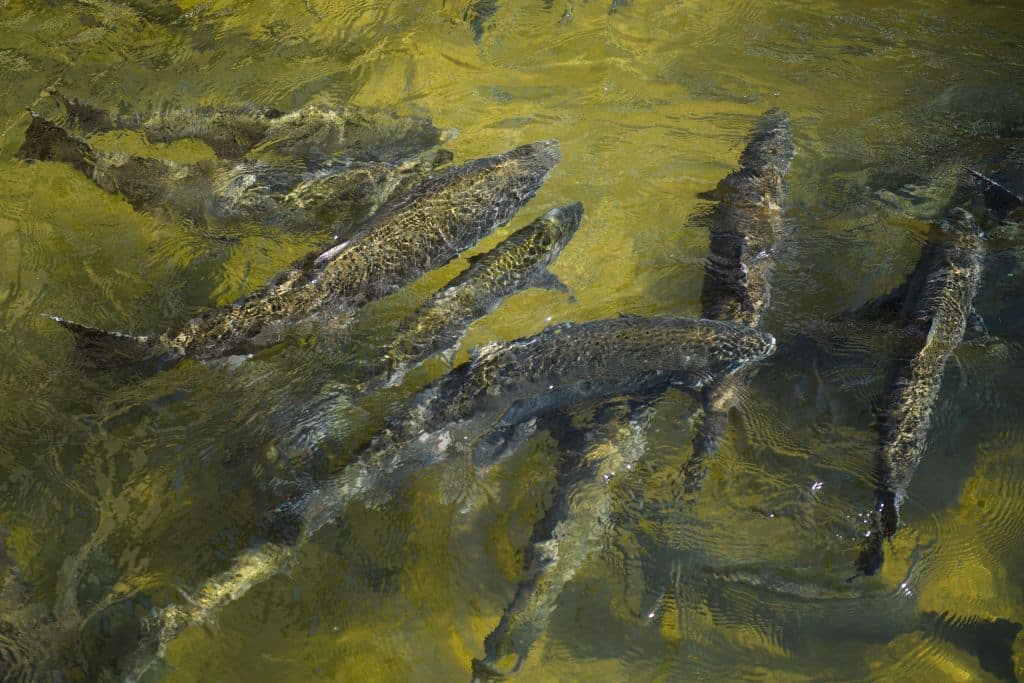Chinook Salmon Season Canceled for Much of U.S. West Coast as California Recovers From Drought

 Why you can trust us
Why you can trust us
Founded in 2005 as an Ohio-based environmental newspaper, EcoWatch is a digital platform dedicated to publishing quality, science-based content on environmental issues, causes, and solutions.
For the first time in 14 years, there will be no commercial and recreational Chinook salmon fishing for much of the California and Oregon coast this season.
That is the decision of the Pacific Fishery Management Council, announced Thursday, due to the low numbers of the popular salmon species returning to California rivers and streams.
“The forecasts for Chinook returning to California rivers this year are near record lows,” Council Chair Marc Gorelnik said in a press release announcing the decision. “The poor conditions in the freshwater environment that contributed to these low forecasted returns are unfortunately not something that the Council can, or has authority to, control.”
Those poor conditions are due to a combination of California’s long-running drought, which was turbocharged by the climate crisis, and the often political battle over how to allocate the water that remains. The scarcity of water makes it harder for salmon to spawn and swim to the ocean.
“Salmon flourish when we have very wet conditions. Cool temperatures are good for the eggs. They survive better. And when the juveniles then migrate to the ocean, if there are high flows, they survive much, much better,” NOAA Fisheries’ Southwest Fisheries Science Center Fisheries Ecology Division Director Steve Lindley told The Washington Post. “None of those things were happening very often in the last decade.”
At the same time, San Francisco commercial fisher Sarah Bates argued in for Cal Matters, that, when water does run scarce, agriculture is prioritized over salmon habitat. Trump era water management rules that directed even more Sacramento River Basin water to agriculture exacerbated the crisis, other fishers told CBS News. The Sacramento River, along with the Klamath River, supply most of the Chinook salmon caught off the Oregon coast.
This year, California Department of Fish and Wildlife scientists estimate that only 169,767 adult Chinook will return to the Sacramento River in the fall, which is one of but not the lowest estimates since the current system started in 2008. The number estimated to return to the Klamath is 103,793 adults, the second lowest forecast since that river’s accounting system began in 1997.
In response, the council fully canceled the commercial and recreational California ocean fishing season from the Oregon to Mexican border, as well as the commercial fishing season in the Oregon and California Klamath Management Zones. This is the first time the season has been canceled since between 2008 and 2009, according to CBS. The decision still needs to be finalized by the U.S. Secretary of Commerce, who typically follows the council’s advice.
Luckily, there is hope for California’s Chinook salmon following the state’s extremely wet winter.
“This should be good for the salmon,” Lindley told The Washington Post. “We should see benefits from this in a few years.”
However, Bates also said that regulators could not rely on the weather to save the salmon.
“This should be an opportunity to make changes and ensure this tragedy doesn’t occur again in 14 years,” Bates wrote. “California needs serious change in water management. We need our governor, Department of Fish and Wildlife, U.S. Bureau of Reclamation and state Department of Water Resources to ensure sufficient flows of cold water through our river ecosystems. We need solutions that don’t frame the problem as farms versus fish but strike a balance between both land and ocean-based food resources.”
Subscribe to get exclusive updates in our daily newsletter!
By signing up, you agree to the Terms of Use and Privacy Policy & to receive electronic communications from EcoWatch Media Group, which may include marketing promotions, advertisements and sponsored content.

 233k
233k  41k
41k  Subscribe
Subscribe 




